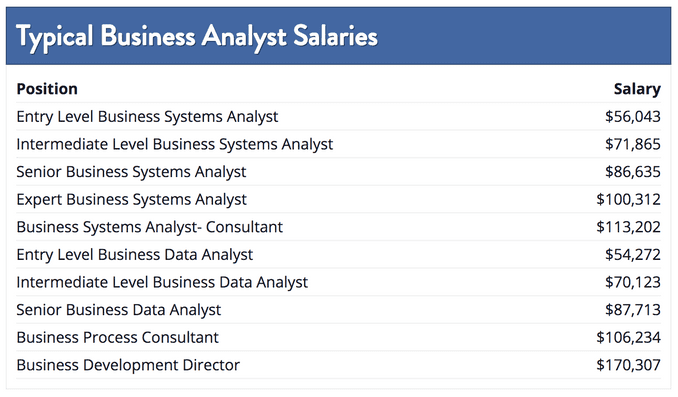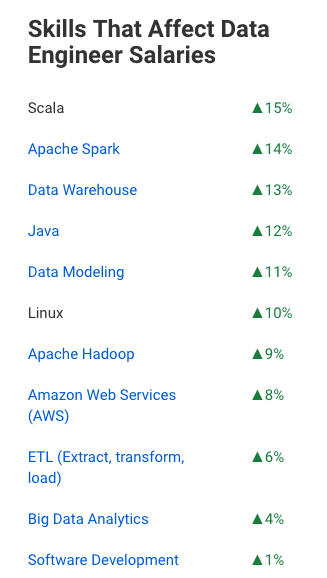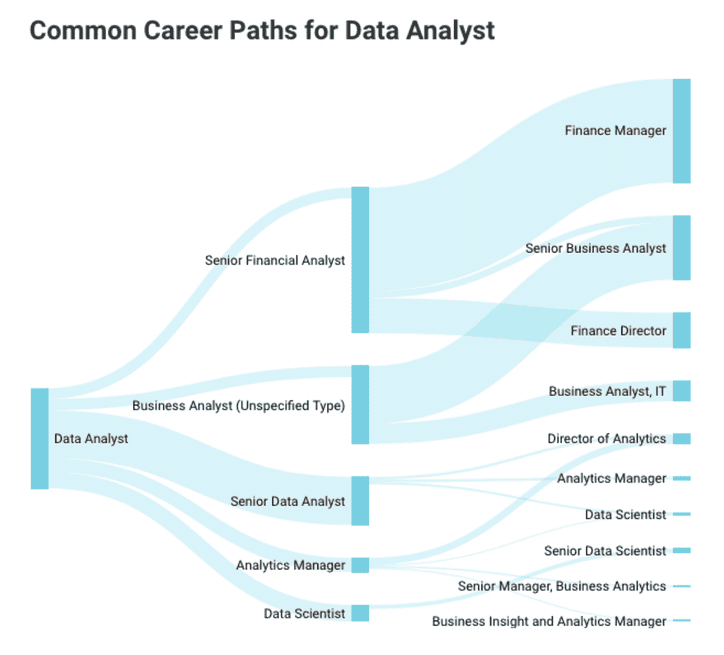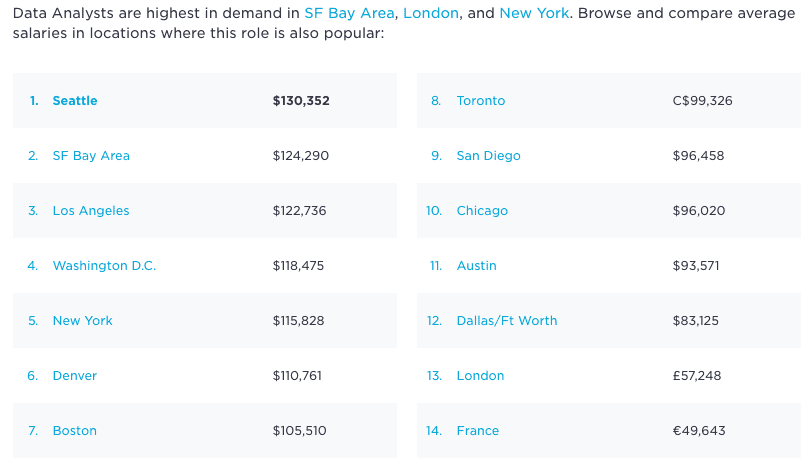
Which Industry Pays the Highest Data Analyst Salary?
We analyzed salary information to determine what the typical data analyst salary is, which industry pays most, and how you can maximize your earning potential.
People send an average of 188 million emails every minute. We watch 4.5 million YouTube videos and fire off 18.1 million text messages in the same timespan. In fact, we produce over 2.5 quintillion bytes of data each day.
This means that more and more companies are looking for talented analysts to process and interpret this valuable data. By 2020, data science and analytics (DSA) job openings are predicted to grow to 2.7 million, representing a $187 billion market opportunity.
Data analytics is an attractive career for those with a mathematics, statistics, or business background. The data analyst position often involves data mining, using languages like SQL/CQL, R, and Python to extract insights from large data sets, and communicating those ideas through visualizations and reports.
The need for data analysts is clear. But how much can you earn as an entry-level data analyst? What is the typical career progression? Can you increase your pay grade by targeting a different job title, transitioning to another industry, or moving to a new city?
What to Expect at Different Levels of Experience
Earnings in data analytics are well above the median income of $47,000 for a full-time U.S. worker, but actual salaries change dramatically based on experience level.
Zippia reports that the average entry-level business / data analyst salary for someone with up to two years of experience and a bachelor’s degree is $54,000. After two to four years on the job, you can expect an average salary of $70,000. A senior analyst with around six years of experience commands a higher salary of about $88,000, but a specialization can make the data analyst salary soar past the $100,000 mark. (Zippia analyzed its own data plus salary information from the U.S. Labor Department, PayScale, and Salary.com.)

Data analyst salaries increase steadily over the first five to 10 years, but afterward, it can prove difficult to obtain raises without broadening your skill set.
For this reason, many data analysts end up switching to careers in data science or data engineering. As demonstrated by the differences between data analysts and data scientists described here, data scientists tend to have more specialized skills in advanced programming, data modeling, and machine learning, which justify a pay increase.
According to the University of Wisconsin, the average data scientist earns $113,000, with salaries typically starting between $50,000 and $95,000.
(It’s important to note that there continues to be some fluidity when it comes to data-related job titles. Analysts may decide to apply for both data analyst and data scientist job postings, depending on their skills and knowledge. It's wise to pay more attention to the job requirements than the title itself.)
Data science positions may specify knowledge of languages and programs like Java, Python, predictive modeling algorithms, R, Business Objects, Periscope, ggplot, D3, Hadoop, Couch, MongoDB, and Neo4J. O’Reilly’s Data Science Survey shows that knowledge of Spark and Scala can add a $15,000 salary boost, while mastery of D3 results in an extra $15,000.
PayScale predicts that five to 10 years of additional experience in data science is equal to $20,000 more in annual salary, 10 to 20 years of experience translates into $30,000 in additional salary, and more than 20 years of experience results in a $55,000 pay boost over time. Hard work definitely pays off in the long run.
Another career path for people interested in building data pipeline architecture and infrastructure is that of a data engineer. On Glassdoor, data engineers report salaries between $110,000 to $155,000, with average salaries nearing $138,000. Skills, ranging from software development to Scala, result in anywhere from a 2-17% salary boost, according to PayScale data.
Transitioning from data analysis to data engineering usually requires coding, machine learning/artificial intelligence, and/or natural language processing experience. Many job postings also look for a master’s or Ph.D. in computer science, math, engineering, or statistics.

What to Expect in Different Roles
As data analytics becomes a fundamental part of every industry, there is an increasing number of career paths to choose from. Data analysts can add tremendous value to different industries and progress within those fields. And this can impact the data analyst salary.
Data analysts who turn data-driven insights into actionable business recommendations are often called business analysts. They use tools like Excel, Tableau, and SQL. Business analyst salaries range from $54,700 to $69,000 at the entry level.
Financial analysts work with financial data to predict company performance and analyze macro and microeconomic trends, creating financial models and forecasts. The 2017 Robert Half Salary Guide for Accounting and Finance calculates that most entry-level financial analysts at large companies make $52,700 to $66,000 and up to $50,000 in bonuses and commissions.
Market research analysts use sales, competitor research, and customer survey data to scope out the landscape for a particular product or service and how to optimize segmentation, targeting, and positioning efforts. This requires communication and storytelling abilities in addition to strengths in quantitative data analysis. The starting salary range for this career is between $51,000 and $65,000.
Healthcare data analysts manage analytics within hospital settings to streamline administrative tasks and improve the efficiency of operations. These professionals earn $46,000 to $80,000 and often have a particular interest in the healthcare industry.
Data analytics consultants apply the same data analysis skills; however, they advise several clients instead of working in-house for one company. They may evaluate an organization’s data capabilities and technical systems, create new dashboards and reports, and suggest improvements to business processes. Salaries in this position vary from $58,000 to $112,000.

With data analysis skills, you can choose from other career paths that may not have “data analyst” in the title, but require similar experiences and qualifications.
For example, transportation logistics specialists usually work for delivery/shipping companies, airlines, and urban planning organizations. They use analytics to understand the most efficient transportation routes, given variables such as traffic, weather, and time of day. Salaries for transportation logistics specialists usually start around $79,000.
Digital marketing managers also use tools like Google Analytics to understand the effectiveness of different advertising/marketing channels and track how investment in campaigns translates into customer acquisition and click-through rates. According to Glassdoor, digital marketing managers make a base pay of around $73,000.
Operations analysts work with data collection, management, and reporting, as it pertains to streamlining and optimizing a company’s internal processes and procedures. Salaries for operations analysts start at $54,000, according to Payscale, but increase significantly as people progress to the managerial level.
IT systems analysts need to understand the technical requirements of an IT system, usually for testing and deploying software. They conduct research on pain points and figure out how to use custom tools to change technical configurations, design new workflows, and analyze the impact of system changes on stakeholders. Systems analysts usually start with salaries of around $68,000.
As you can see, data analysis is a very versatile skill set that makes you attractive to employers across diverse fields. As a data analyst, you can easily craft a career around your functional and industry areas of interest and expertise.
How to Boost Your Data Analyst Salary
If you are interested in increasing your data analyst salary, there are many ways to do so, beyond choosing an attractive industry. Here are some other strategies for improving your hireability in the market.
Expand Your Skill Set
By learning new tools like Spark and Scala, D3, cloud computing software such as Amazon Web Services, and open-source tools, you can increase your earning potential dramatically. The most valuable analytical skills are MapReduce (average salary of $115,907), PIG ($114,474), machine learning ($112,732), Apache Hive ($112,732), and Apache Hadoop ($110,562).
Choose the Right Location
Jobs in large cities like Chicago, San Francisco, and New York tend to pay the most. Generally, companies benchmark salaries against competitors when recruiting talent. When deciding whether or not to relocate, think about state taxes and the cost of living in the places you are considering. Some remote positions may pay less, but the flexibility of working from home in a cheaper city or country could constitute a more attractive offer.

According to IBM, only 6% of data analyst postings require a master’s degree or higher, whereas 39% of data scientist and advanced analytics postings look for graduate-level education. Even without returning to formal education, there are many ways to increase your skill set through online courses and bootcamps.
This type of training shows future employers that you are eager to learn and develop new areas of expertise—a major plus in a field that is constantly evolving.
Both data analytics and data science are growing and lucrative fields, and you can’t go wrong with either. Looking to prepare for data analytics roles? Check out University of North Florida, Division of Continuing Education’s Data Analytics Career Track. You’ll learn both the technical and business thinking skills to get hired—job guaranteed!
If you have more experience or want to move from data analyst to data scientist, consider University of North Florida, Division of Continuing Education’s Data Science Career Track. It’s a self-guided, mentor-led bootcamp that can help you prepare for the next step in your career.
Learn online from an industry-driven curriculum for a career in data.
